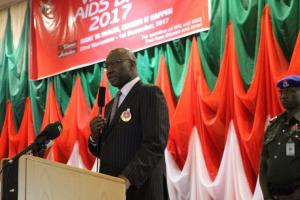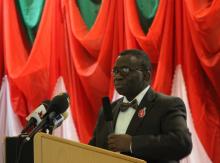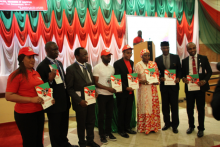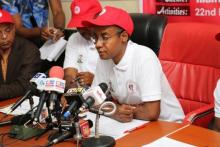Nigeria requires commitment by the 3-tiers of government to avert deaths among untreated 2 million persons living with HIV/AIDs.
Abuja, 29 November 2017 - Nigeria has the second highest burden of Human Immunodeficiency Virus (HIV) infection in the world. With about 3.2 million people living with HIV, the country requires all three tiers of government to respond to the epidemic.
Stakeholders who converged at the Banquet Hall of the Aso Rock Villa in Abuja on 28 November, to commemorate the 2017 World AIDS Day, were unanimous that the fight against the scourge needs combined investments from all tiers of government, civil society, development partners and organized private sector. This year, Nigeria is marking the annual event, with the theme: 'Right to Health, Making it Happen', earlier than the commemorative date (01 December 2017).
Reading the speech of His Excellency, President Muhammadu Buhari, the Secretary to Federal Government (SGF) of Nigeria, Mr Boss Mustapha, pledged Nigeria's commitment to increasing federal budgetary allocation to the health sector as well as towards maintaining government's funding for treatment of 60,000 people currently living with HIV. The Federal Government also plans to place additional 50,000 persons on antiretroviral therapy (ART) every year from 2018.
“Our commitment to universal health coverage for all Nigerians aligns with the African Union Roadmap on Shared Responsibility and Global Solidarity to address HIV/AIDS, Malaria and Tuberculosis in an integrated manner”, the SGF stated.
Poor indicators require all-inclusive intervention.
In 2016, of the 37 million people living with HIV globally, 10% or 3.2 million reside in Nigeria. Of concern also, is the fact that Nigeria is disproportionately accounting for more than 10% of new infections, peadiatric HIV cases and AIDS deaths globally as a result of having 1 in 3 of people living with HIV on ART as compared to 2 in 3 in other high burden countries like South Africa.
Indeed, only about one third of the 36 states and Federal Capital Territory (FCT) have surpassed 50% ART coverage. The rate of mother to child transmission of HIV in Nigeria remains unacceptably high with only a third being prevented presently. With these poor indicators, the Minister of Health, Professor Isaac Adewole called on all stakeholders to mobilize obligatory human and material resources to deliver critical interventions, which according to him, will positively influence HIV risk, transmission, morbidity and mortality.
The Minister pointed out that providing services to Nigerians living with HIV/AIDS is a fundamental human right and must be met by all. He further noted that access to services need scaling up in order to achieve the 90-90-90 target (which specify that by 2030, 90% of all people living with HIV will know their HIV status, 90% of all people living with HIV who know their status will be on ART, and 90% of all people receiving ART will have viral repression).
Financing HIV treatment and PMCT services.
With HIV treatment and PMCT as two areas that reflect the performance of the health system, stakeholders, including the Diplomatic Corps, UN System in Nigeria, CSOs that attended the occasion advocated for increased budgetary allocation by all tiers of government and implementation of complementary financing mechanisms to sustain the HIV epidemic response.
Other speakers at the event advocated the complementary financing mechanisms through inclusion of HIV in national and state health insurance schemes; establishment of private sector led trust fund and operationalization of Basic Healthcare Provision Fund (BHCPF) provided for in the National Health Act of 2014.
Launching National Strategic Framework
The 2017 World AIDS Day commemoratory event was utilized to launch the National HIV/ AIDS Strategic Framework (NSF 2017-2021) which aligns the country’s targets to the global 90-90-90 targets of 2020. The NSF build on lessons learnt, achievements, and gains made with the National Strategic Plan 2010-2015. The document was launched by Dr Hajjo Sani who represented her Excellency, the wife of the President.
Representatives from National Agency for Control of AIDS, United Nations System, including WHO, UNAIDS and UNICEF joined the Presidency to launch the document.
The week-long activities marking the 2017 World AIDS Day in Abuja were launched through a Press briefing held on 22 November, 2017 and include on-going HIV testing for the general population, vulnerable groups and pregnant women. Other activities include creation of more awareness on the HIV response to the epidemic. Similar activities are also on-going across the 36 states.
For more information, please contact:
Dr Rex Mpazanje; Tel: +234 803 638 9632; Email: mpazanjer [at] who.int
Dr Funke Ilesanmi; Tel: +234 903 722 8596; Email: ilesanmio [at] who.int



